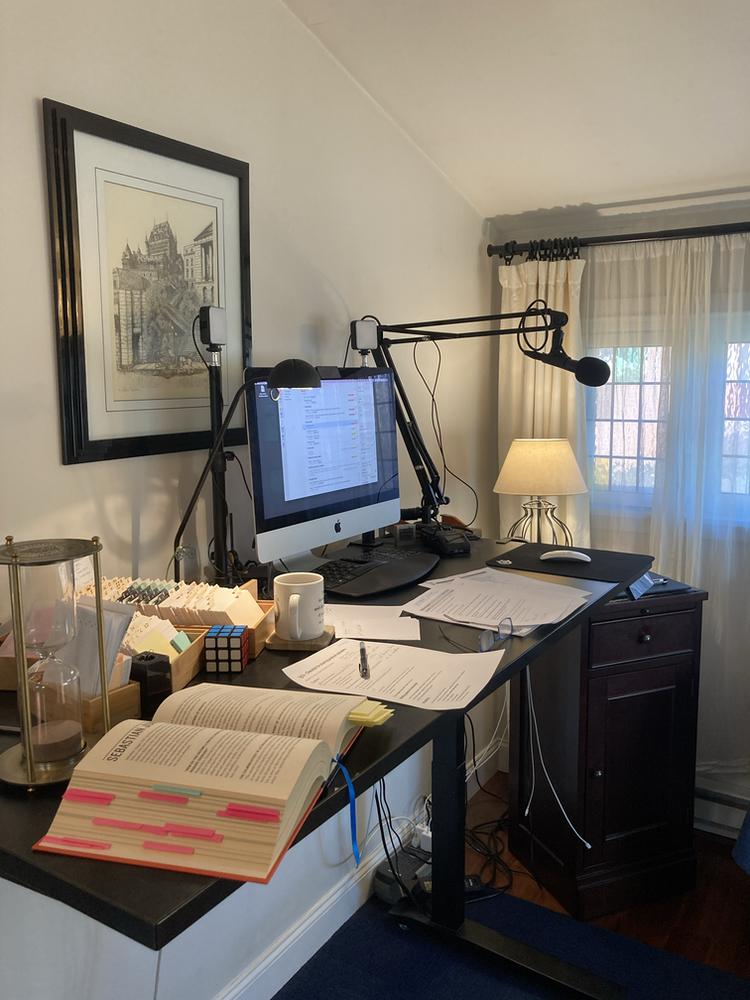Can we invite insight instead of chasing it?
I’m struck often by interesting relationships between how words are spelled and their meaning. Taken literally, the meaning of “sight” is what our eyes normally do, and things which can be seen are “in sight.” Now consider “insight,” which is about apprehending some new (to us) idea. But for some reason, we consider vision and thinking so closely related that the word for the new thinking is just the words for being seen.
The pile of unread books we have on our bedside tables is often referred to as a graveyard of good intentions. The list of unread books on our Kindles is more of a black hole of fleeting intentions.
~ Ross Andersen, from Stagnant and dull, can digital books ever replace print?
Exactly. Because consumption is not the only reason for having a book.
Having the books physically take up space in my environment is a key feature—not a bug! When I have a spare moment the books’ proximity draws me to them; This enables me to affect my future self (albeit only slightly) by setting in sight things that would improve me through their reading.
A point of view can be a dangerous luxury when substituted for insight and understanding.
~ Marshall McLuhan
By intentionally placing physical books “in sight,” I’m cultivating a point of view I hope will trigger “insight” in my future self.
Knowing about a tool is one thing. Having the guts to use it in a way that brings art to the world is another.
~ Seth Godin from, Tools vs insight
I know my tools, I have the guts to use them, and I’m bringing my art to the world. What I’ve not yet figured out—the insight I’ve not yet achieved—is how to feel that what I’ve done so far, and what I’m doing now, are enough.
Generous silence provides space for the other person to be with their own self, for you to be with them for presence to show up. It allows them to take a breath. It whispers, “this is an interesting place to be. Let’s hang out here for a moment.” […] Generous silence can allow the delicate insights of a conversation to blossom and bloom.
~ Michael Bungay Stanier
Those three words—silence, whispers, delicate—are doing important work there. They’re not required for insight, but they’re nice. (Getting punched in the face in a noisy crowd would probably be none of those three, but would still be insightful.)
That’s how I got mitochondria.
~ Randall Munroe, from Stromatolites
No one asked me, but if I was asked to summarize Munroe’s work I’d say: He’s mastered the art of finding insight by shifting the scale. Why is that hard? Why is that helpful? Why is that great? Because doing it at the mastery level (as Munroe does) requires one to have integrated a lot of knowledge. A lot.
We have far more control in our lives than many embrace. We create or co-create our experiences in life, and each day is a new opportunity to be fully engaged in the present moment. It’s the present moment where glimpses of our potential are revealed and expressed. A living masterpiece is not drawn on a canvas or etched in stone or inked by pen. It’s the pursuit and expression of applied insight and wisdom.
~ Michael Gervais
Conversation is a fine art, and there are a bunch of insights in this little conversation with Ira Glass:
I’m ambitious! I want the stories to be special and I want the interviews to be special. The nervousness is my fear that they won’t be, and my awakeness to how hard it might be to get it to work. If you have any ambition, you march into the interview with a battle plan. You have this theory about what’s going to happen with this other person but you really have not the best idea if it’s going to work. Interviewing is an art form that so depends on the soul of the other person and also on how the two of you interact.
~ Ira Glass, from Ira Glass
I particularly like that one about nervousness as a sign that we are doing something right as podcast creators. What’s the hard work? What’s the part that makes us a little nervous?
Until next time, thanks for reading.
ɕ
